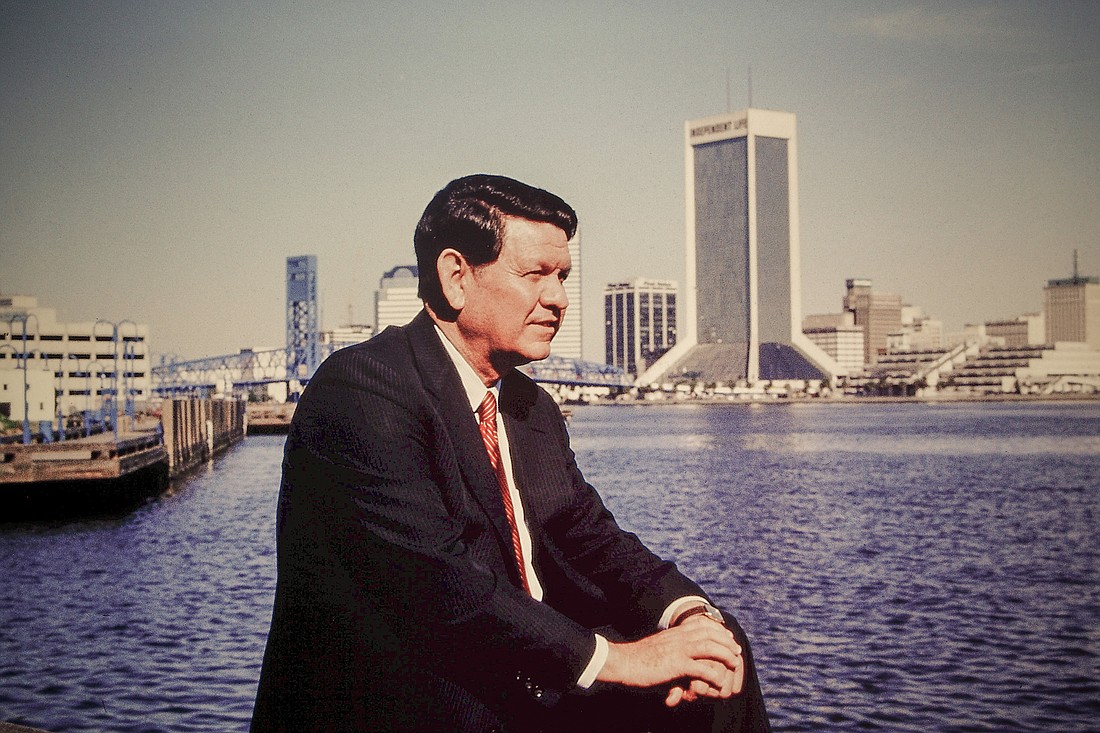
A populist and a visionary.
That’s how people describe the late Jake Godbold.
A City Council member from 1967-79 and Jacksonville’s mayor from 1978-87, Godbold died Jan. 23 at age 86.
He is remembered for many contributions to his hometown, perhaps most notably, “Colt Fever,” a grassroots campaign in August 1979 to bring the NFL to Jacksonville by courting the owner of the Baltimore Colts, who discussed moving the team after talks with Baltimore about a new stadium.
With just a few days of promotion, 50,000 people filled the old Gator Bowl stadium screaming for the Colts when Godbold and team owner Robert Irsay arrived by helicopter and landed on the 50-yard line.
Godbold’s enthusiasm and his belief in what was a dream more than 40 years ago became reality in November 1993 when the NFL awarded its 32nd franchise to his hometown.
But there was more to Jake Godbold than his determination for a football team.
During his time as mayor, the city gained the Southbank Riverwalk and The Jacksonville Landing Downtown. The Mayo Clinic was established in Jacksonville and corporate growth added offices in urban towers and suburban campuses.
‘He didn’t give up’
In 1979, Frances Bartlett Kinne went from professor at Jacksonville University to its acting president and was inaugurated as its permanent president a year later.
As she was building the university’s academic reputation and community stature, she got to know Godbold during her nine years as president.
“One of the most important things about him was that he didn’t give up. He stuck with things and any time he got involved with a project, you knew it would be successful,” Kinne said.
The arts and economic development
Decades before it was accepted as a strategy, Godbold understood that promoting the performing arts could be not only an amenity for the community, but a path to economic development.
Mike Tolbert was the mayor’s aide in 1979 when Godbold decided that the fishing village near the Beaches needed some help.
“Jake wanted to do something at Mayport because the shrimpers were having a hard time,” Tolbert said.
Godbold at first considered a fishing tournament, but eventually he and Tolbert decided a music festival with a major headliner could fit the bill.
“We chose jazz because it seemed to work in that environment and it crosses all demographics,” Tolbert said.
While Dizzy Gillespie, Della Reese and the Buddy Rich Band were on the stage at “Mayport and All That Jazz,” there were 20 food and beverage booths at the festival to serve the thousands of people in the audience.
Tolbert said half were set up by local restaurants and half were staffed by local civic and faith-based organizations.
“They sold a lot of food. One of the churches raised enough money to build a sanctuary,” Tolbert said.
The event has become a tradition, with the 40th annual Jacksonville Jazz Festival scheduled May 21-24 at several Downtown venues.
Barbara Benisch, a nonprofit consultant now living in Asheville, North Carolina, moved from New York City in 1984 to become executive director of the Arts Assembly of Jacksonville.
The organization had recently restored the Florida Theatre to its original 1920s-era glory after years of neglect.
She remembers Godbold as “gracious and welcoming” and looking to the future.
“Mayor Godbold saw the possibilities. He believed in the arts and saw the role they could play in the development of the city,” Benisch said.
Influencing his successors
After leaving office, Godbold never stopped being active in community affairs. In the last weeks of his life, he was a persistent opponent of the privatization of JEA.
He also made impressions on the mayors who came after him.
Former Mayor John Delaney was in office when the Jaguars played their first game in 1995. Delaney said he made sure Godbold and his wife, Jean, who died in 2013, were guests in the city’s suite to witness Jacksonville history.
“I think of the attitude change he brought to the city. If Jake had a choice between eating and living and Jacksonville, he’d choose Jacksonville. I think that was best symbolized by us getting an NFL team,” Delaney said.
Former Mayor Tommy Hazouri, now City Council vice president, was elected to the city’s top office in 1987 when Godbold was term-limited. He said Godbold’s dedication to developing Downtown continued as his successors took office and continues today.
“He left the soul of Jacksonville for us. Jake’s epitaph will be the cranes that will be up in the next three years,” Hazouri said.
“I knew Jake a long time and relied on him for counsel,” said former Mayor John Peyton.
He admired Godbold’s ability to help reach diverse groups with diverse priorities reach consensus.
“Jake was a master of pulling people together to share a vision. He reached out to all corners of the county.
“He earned trust and faith and he never stopped advocating for Jacksonville up until his last breath,” Peyton said.